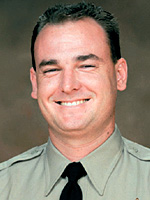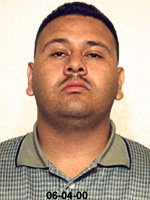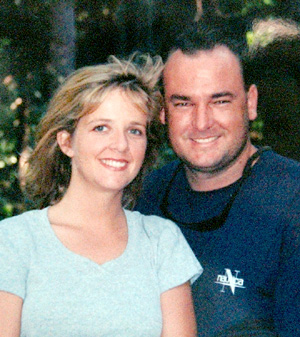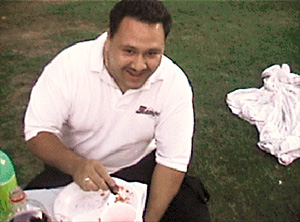|
|
|
 SCV NEWSMAKER OF THE WEEK:
SCV NEWSMAKER OF THE WEEK:
Teri March, 2003 Newsmaker of the Year
Interview by Leon Worden
Signal City Editor
Sunday, February 22, 2004
(Television interview conducted Feb. 12, 2004)

"Newsmaker of the Week" is presented by the SCV Press Club and Comcast, and hosted by Signal City Editor Leon Worden. The half-hour program premieres every Wednesday at 9:30 p.m. on SCVTV Channel 20, repeating Sundays at 8:30 a.m.
This week's newsmaker is the SCV Press Club's Newsmaker of the Year for 2003 — Teri March, widow of slain Sheriff's Deputy David March of Saugus. The following interview was conducted Feb. 12. Questions are paraphrased and answers may be abbreviated for length.
Signal: Your husband, Sheriff's Deputy David March, was shot and killed in the line of duty just about two years ago. The suspect, Armando "Chato" Garcia, fled to his native Mexico. Since then you've been on a quest for justice. What, to you, would be justice?
March: Well, that he would serve time in a prison cell where he would get a judicial system to give him the proper punishment for the crime he committed here in the United States.
Signal: Does that necessarily mean trying him in the U.S.?
March: That would be my ultimate desire, yes.
Signal: Is there any possibility of prosecuting him in Mexico?
March: Yes. They call it an Article 4 prosecution. If we don't reduce our sentence, meaning that (if) we don't give Mexico the guarantees that we will not give him life in prison or the death penalty ... it goes to an Article 4. (Under) Article 4, it just goes before a judge (in Mexico) and the judge will make a determinant sentence — usually about 60 years, if it goes right.
Signal: There are no guarantees.
March: No. I've heard nothing but horror stories. They get acquittals because the language is wrong, maybe the terminology is wrong; reduced sentences, minimal jail times. I've heard of one case where a guy got two years and now he serves weekends for killing a 17-year-old.
Signal: Killing a 17-year-old in the U.S.?
March: Correct.

Deputy David March
|
|
Signal: Has the Mexican government offered to cooperate if District Attorney Steve Cooley will agree to a maximum sentence of 60 years?
March: As I know it, they basically want us to guarantee that he will not spend a life-determinate sentence in our jail system. So they want something that's comparable, which is up to 60 years, which some do serve, supposedly, in Mexico. So that's where that figure comes from.
It's not the situation with Dave. They have not even seen any of the evidence. They don't know really where the case stands. They're just using that as a forum to what their maximum sentence would be in Mexico for premeditated murder.
Signal: What should be the punishment if Garcia is found guilty in a court of law? Do you want to see life in prison? Do you want to see him put to death? Or would you accept 60 years?
March: Emotions range. It has been two years of a lot of emotions, from anger to pain to confusion. The way I feel today, two years later, is, I don't feel hateful toward him. I don't really know why. I feel probably more disappointed in our justice system. I'm disappointed in our politicians for not responding to the letters requesting change, desiring change, not just for Dave's case but (for) the other 360 families here in Los Angeles.
You know, I haven't seen this guy in my face, I haven't seen his cold eyes. I haven't even heard the story, or why it happened. So I don't know until that day comes. I guess my faith is that I would give it to the jury to do the right thing.
Signal: Describe the events of April 29, 2002, as you know them.
March: It was a super-beautiful day. Dave had gone to work about 6 a.m., and about 10:30 in the morning he made a traffic stop. The suspect started to exit his car. Dave ordered him to the back of his car. The guy went without any sort of resistance.
They had some words exchanged about having some identification. Dave asked him to turn around. What happened there is unclear. He went to put his hands behind his back, and at that point, Chato pulled a gun from his waistband. It was in the front. He spun, shot Dave in the bicep. It entered his chest where the vest didn't cover. And then Dave fell to the ground. Chato started to walk away and then came back and fired a gunshot wound to his head and fled the scene.
It was very confusing, initially. There were numerous reports that there (were) three people. I remember finding the news out, and the first thing I asked was, "Did you get him?" and they said, "We had somebody in question." But by a couple of days, they had finally told me that he was in Mexico, and that they confirmed that.
At that point I said, "OK, we're going to get him, right?" Because they just, "We know where he's at," and he said, "We have a very good idea of where he's at." And then I was explained how Mexico doesn't want us interfering with their justice system and their police system, and I was explained Article 4's, and you know, your head's spinning.
I thought Mexico was a place to hide because that's the way I used to think. I was na´ve. And then I learned a lot of the bureaucracy. I learned a lot of the politics. I learned a lot of red tape that was very disappointing to find out.

Armando Garcia in 2000
|
|
Signal: Your husband was how old?
March: 33.
Signal: And Armando Garcia, how old was he?
March: They have estimated 25 or 26. Not very good birth records in Mexico.
Signal: Garcia was an illegal alien with a past criminal record in the U.S.
March: That's correct.
Signal: What's the story on him?
March: From what I understand, he has been pretty much a despicable piece of society from youth. From what I know, he had been deported on three different occasions, different charges. He had weapon charges — he had a weapon; selling drugs — he's a methamphetamine dealer; and just six months before Dave was shot, he was wanted in connection (with) two different, unrelated attempts of murder.
I'm sure that when Dave pulled him over in broad daylight that day, Chato was probably very certain that it was for the crimes that he had just done two months prior and six months prior. And you know, an officer is — Dave was marked. (Garcia) had made a vow that he'd kill a police officer, anybody (who) tried to stop him. He made good on his promise, and he's safe (on) Mexican soil.
Signal: Do you know whether Dave would have been alerted, when he pulled him over, that this was a dangerous guy?
March: From what I understand, from the time that Dave entered (Garcia's) driver's license and exited the car, and from the time the Samaritan used (March's) radio to notify that there was an officer down, less than two minutes. So when Dave ran the plates, the plates came back a woman's name. It wasn't the driver, obviously.
There's a lot of confusion about them calling — you know, there's just a lot of unforeseen problems. They called it "car stolen." That person lied, so there was a lot of mix-up for the first couple hours. So — I don't think he knew who he was dealing with.
It was such a sucker punch. From what I understand, Dave didn't even have a chance to flinch. It was just so quick and so sudden and both of the wounds were fatal.
Signal: You've spent the last two years pursuing political change. But what about other, more personal options? Where in Mexico is Armando Garcia?
March: They don't tell me. Because they know I would probably blab about it. I don't know, to be honest. I know he's deep in Mexico and he's in a rural area, and he's just having his life.
Signal: Have you hired an investigator?
March: No. I'm hoping that the Sheriff's Department is doing what they're supposed to do...
Signal: Have people offered to go down and bring him back, or otherwise deal with him?
March: It's funny because you hear people go, "Oh, I'll just go down there one weekend," and I just thought — the first year I said — man, Dave had the most heroic burial. I really knew that my husband gave the ultimate price which is out there, protecting and serving, and that the people surrounding him in law enforcement supported him.
So I just figured it was going to be common practice, it was going to be the most natural thing, that they were just going to tell me, "Mrs. March, guess what? He's either dead, or he's here, we don't know how." I just assumed that that would happen. You know, I was picking up pieces of my life, and all my dreams were ripped away.
So once the year passed and I started watching the frenzy kind of go away, I started getting really anxious. I started knowing that it as time for me to start getting involved. And when I saw the eyes of the other families who have been — five years, no help, no justice, no resolve — I realized that it was a matter that I had to deal with.
Signal: How many people are in your situation — victims with a family member murdered by someone who has fled to Mexico?
March: According to the district attorney it's ... 360 in Los Angeles County. The families that we've ... personally met — it's not an issue, but I'm bringing it up — they're all Latino. I mean, 90 percent of the victims are Latino. So it's not white, police, Republican-Democrat. It's the broken system that's allowing this to happen.
Signal: In terms of somebody bringing him back — there is a reward out there.
March: There is. And the problem is, you cannot abduct someone in Mexico. ... There has been a case in the past where somebody was abducted against their will and it was (acquitted) in our government. So you can't just nab Armando.

Teri & David March
|
|
Signal: The court wouldn't allow it?
March: That's the hardest thing. You've got a killer, or you've got a kidnapping. One removes that element out of society and saves people. Or we allow him to go free.
Our system is very perverse and backwards and — I was so much happier being na´ve and a little (blissful), but you know? I said I wanted Dave's death to really count for something. I wanted to see that he gave his life — or rather his life was taken — for something good.
I have hope that it still will be. He was too amazing and too great on this Earth to just be buried and then that be the end of it and Chato gets to remain living his life of freedom.
I mean, that's what he killed Dave for, was freedom. And it'll be over my body that he can snub me and the system.
Signal: If Garcia were to step on American soil he could be apprehended by the police.
March: Yes.
Signal: Do you have any reason to believe he has been back over the border in the last two years?
March: I don't have reason to believe that. I think he'd be a fool to do that. He's playing the cards, and he's playing it the way an evil person would play them, and I think that would be foolish. I think he is really probably literally waiting for the dust to settle, and probably waiting for me to be quiet so he can come back and visit his family. But I'm not going to.
Signal: What are you trying to accomplish in our political system?
March: Truth. That's it. I mean, I'm not — it's a hard situation to be in. I don't like this life that I've been put into, but it's something you know is right. You know it's for the bigger cause. You know it's not going to bring your husband back. It's not going to bring April 29th back. It's not going to change anything. It's the bigger situation. I have a daughter. I have, maybe, more children in my life. I'm thinking, gosh, the system has to get better, and maybe this is one part that God maybe wants me to do, just to educate people.
(I) always thought, as long as I have a leg in the race, and when I'm tired, I'll stop. Because this is not my life. I want to live again. I want to be happy. I want to feel joy. I know life goes on. It's finding balance and sticking to what I believe my morals are, and seeing that justice does prevail.
Signal: Who have you been dealing with?
March: (There have) been a lot of letters and maybe (fewer) responses. I have, well, we'll start with the big guys first.
President Bush we met, May of 2003. It was National Police Week, and I wrote him a letter and thought that that might be my only chance to get it to him. ... He got it and stuck it in his coat pocket. He actually came down to all the families and talked to us, and I thought I would only have 10 seconds, but he really gave me more time than that. I basically said, as fast as I could, my husband's killer went to Mexico ... and he said, "We need to get him back." I said, "Ahh, with your help, that's what we need."
I swear to God, I really thought: Hope. And he told Dave's parents this, and he reiterated it, and told me how beautiful my daughter was, and told me that Dave had a great smile. You know, just really personable.
Signal: What did he indicate he could or would do?
March: I didn't think I had that chance, to put him on the spot. I just took his word. Since then I've written him, gosh, I don't even know how many times — sometimes the same letter, sometimes different letters, but at least five different kinds of letters.
I have not even to get a simple form-letter back. And that's upsetting. I can only hope that it's because he doesn't have an answer yet. Maybe he's trying to give me an answer before he writes me back, out of courtesy for Dave's life. I hope.
Signal: You've had more success at the congressional level.
March: Yes. Started with (U.S. Rep.) Buck McKeon. I pretty much went in there with a lot of tears and frustration and pretty much said, "You have to help. People are writing you and I'm not sure why, but what are you going to do?"
And he put a resolution to renegotiate the treaty, look at the treaty, see that it doesn't work.
Signal: The extradition treaty between the U.S. and Mexico.
March: Right. That they have the right to refuse to extradite for life sentences or death penalty.
The way it is, is Mexico wants to dictate what happens here to their citizens. Basically their position is, why should their citizen spend a lifetime in jail and have the death penalty? They believe that it's inhumane, it's not fair, they need another chance at life. And I think, well gee, did Chato think about that when he took Dave's life? Not really. But OK, they have a right to their opinion, and that's fine.
But Dave and I weren't visiting in Mexico. And I don't really understand why, if the crime happened here, why we have to conform to that. But two years later, when you're jeopardizing the witnesses, minimizing their memories of what happened, the evidence getting weak — we're dealing with volatile time. And I start feeling pressured to say, "You know? Something's better than nothing." His freedom is an absolute insult to what Dave stood for, to what law enforcement stood for, and for what the people stand for. Why should this guy be free? He killed a police officer...
OK, we can't change laws quickly. We can't get our politicians to answer like they should. ... My opinion is that we've got to get him in the system, request him to be brought back to the United States, have Mexico say no, and then we get our politicians involved.
Signal: Isn't it the case that Garcia is free today because no warrant has been issued for his arrest?
March: That's correct.
Signal: Couldn't that happen?
March: Yeah. The district attorney's (Cooley's) position is, they believe that if that happens, we give all our muscle power — to change the treaty, to persuade him to come back, to negotiate — to Mexico. Meaning that they now gain control.
Cooley's position is, he is not going to reduce the sentence. (Garcia) is a cop killer. He's going to get life imprisonment or death penalty or nothing. That's his position, and he's standing for the 360 other families and law enforcement. He doesn't want to cut a deal with Mexico and, more specifically, (in) this case. He believes (Garcia) deserves a maximum sentence, to be the example of what happens if you kill a cop.
Signal: An arrest warrant could be issued if — what? If Mr. Cooley requests one?
March: (Yes.) They feel that if a warrant is in the system, that Mexico will most definitely say, "No, we will not extradite him unless you give us the guarantees that he won't spend life in prison or the death penalty."

Armando "Chato" Garcia in 2001
|
|
Signal: But if he were in custody in Mexico, how would that change anything Congress or President Bush might do to change the extradition treaty? If he's in custody, can't those political fights still happen?
March: Absolutely. ... We spent two years trying to find another solution to changing the treaty, getting talks, getting our Justice Department to get involved. It always comes back to: "You can't really blame Mexico for not doing something, because you haven't formally asked."
But when I asked the district attorney (about putting) the warrant in the system, it's always, "Wait, Teri, be patient. We're getting laws changed. We think things are happening. We don't want Mexico dictating or having them compromise what our beliefs are of justice in the killing of your husband."
So meanwhile, Mexico doesn't budge, Cooley doesn't budge, there's no compromise. There's nothing being done.
And I told Mr. Cooley, "You've got two years to get your treaties, get whatever it is that you're trying to do, get your politicians involved," but then it becomes a moral thing to me — and this is that we've got to remove Garcia out of the element, bring his kind out of society — for the safety of the Mexican people, for the safety of law enforcement who are unsuspecting, like Dave. No other family should have to go through what I've gone through.
Signal: You have asked Mr. Cooley to issue the arrest warrant?
March: I told him he had two years, and that will be April 29, 2004. Two years from the day that Dave was shot.
Signal: That sounds like an ultimatum. Two years, then what?
March: Then I say, I want him to put the warrant in the system. And if he tells me no, then we handle it from there.
Signal: What is the status of Congress calling on the president to change the extradition treaty?
March: Well, I don't know...
Signal: Wasn't it approved by a congressional subcommittee?
March: Yeah. But then there will be two people (who) say this isn't an issue that they want to sign because they believe it's a Superior Court decision ruling and that it's a federal issue. ... I'm not sure why they don't attack the issue because it's very straightforward.
Signal: The resolution hasn't passed through Congress.
March: No.
Signal: What does the State Department tell you?
March: The State department says, "Teri, please, at least allow Mexico to have the chance to refuse extradition."
Signal: Which can't happen until the warrant is sworn out.
March: Yes.
Signal: How are you holding up to the bureaucracy? Do you feel you're getting the run-around?
March: I don't know. A lot of faith and a lot of praying. Family support, and constantly just trying really hard to see the bigger picture. I know what I want, which is Chato behind bars. But sometimes, you know, are we holding out on this because it's a story that actually brings attention that a cop was killed?
I mean, sometimes I think unselfishly for the other families who are still waiting, who aren't being at least recognized. There's (another) woman who is fearing for her life. This guy has vowed to come back and kill her, and he's already killer her father. Sometimes I think, well gosh, if they get Dave's killer in custody, the story goes away for them.
Sometimes — I mean, I have a personal situation in this. I wouldn't be involved had I not loved my husband the way I did, and had he not died. Sometimes that gives me peace, because I think I'm doing something to help (the other families). But it's just moving at a snail's pace and I just don't think it's productive.
Signal: Do you have a Web site where people can find more information?
March: Yes we do. It's www.deputydavidmarch.com.
Signal: What's your next step?
March: Continue writing the letters, call for help, and address this issue hardball with Mr. Cooley, with the backing of the Sheriff's Department. They support me.
See this interview in its entirety today at 8:30 a.m., and watch for another "Newsmaker of the Week" on Wednesday at 9:30 p.m. on SCVTV Channel 20, available to Comcast and Time Warner Cable subscribers throughout the Santa Clarita Valley.
©2004 SCVTV.
|
|
|